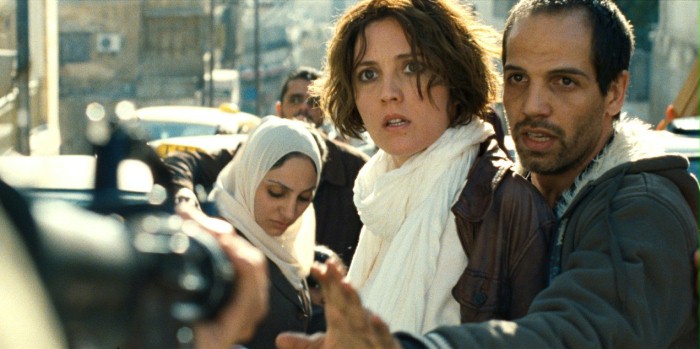
In my country, a female director is a rare exception (but fortunately not for long). In the Middle-East, some consider that a miracle and others a heresy.
On the set of Inch’Allah, filmed mainly in Jordan but also in Palestine and Israel, I was regularly asked if I was an actress, a wardrobe designer
or a caterer. When I replied that I was a director directing my own movie, they would have a good laugh. The production designer got some of that attitude
as well, especially when she erected a 250 yard-long wall to recreate our own “Palestine”. She was a sight to behold, maneuvering her troops and monster
trucks, so frail and rebellious, developing a relationship with the construction workers.
The story of Inch’Allah unfolds in Palestine and Israel but this is not another political movie about the never ending issue in that regional of
the world. This is a movie about three young women – a Palestinian, an Israeli, and a Quebecoise – who are very similar. In different circumstances, they
would have been best friends. However, having been engulfed by the War, the women have their own conflicts inside.
I have actually lived several years between Israel and Palestine, and this film is based on the men and women that I met there. The film is their story.
Travelling by myself in the region as a young woman was one of the most difficult things I ever do in my life. I kept going back because of the people and
especially because of the women, who were usually recluse, silent and discrete.
One of those people, and someone who influenced the essence of the film, was the mother of a young woman named Luna. It was 2005. Two years prior, Luna
blew herself up at a checkpoint. She was 22, the fourth of nine children, and an English Literature student at the local university. Her mother greeted me
in her big house on top of a mountain.
“All the young ones are deeply committed to the struggle,” Luna’s mom said. “She was more committed than the rest.” It was hard for her to tell the story,
especially as a mother who had lost her child. She went on to tell me that one day Luna went out to borrow a textbook from a friend and when she didn’t
come home, her mother feared the worst.
Then turning on the news, a special newsflash announced that a suicide bomber had exploded at the Amara checkpoint. It was Luna. Three Israelis are dead.
“But they always minimize the numbers”, the mother said, her eyes brimming with tears. She insisted that the witnesses reported extensive damages.
“Definitely more than three dead,” she said, with a glimmer of pride, perhaps, concealed behind the pain.
Her family was devastated. Their house was demolished, as punishment. While we were talking, the old lady got up with difficulty, went into the kitchen,
brought back coffee, then left the room again. I heard her rummaging, and she came back with her arms full. She set a large box on the table and retrieved
a pile of diplomas. Luna’s diplomas from high school and from the university; that one postmortem. There was an inscription in ink: “To the Shaheeda
(martyre), Luna.” More diplomas were in the box, awarded by the Hamas to thank her for her participation in the resistance.
The weary mother walked out again and returned with a huge frame – a montage, made by Luna’s father. The inside of Al-Aqsa mosque, with the faces of three
young girls, was cut out and pasted on it. Luna, Mariam and Fatma. The two others were from Bethlehem. Human bombs as well. “She,” the mother pointed her
fat finger, “she was a lawyer.” The military apparently had fired at her brother, right in front of her. She had completed a first-aid class and could have
saved him but they did not let her intervene. A month later, she blew herself up in a Tel Aviv restaurant. 26 casualties.
“For religion or for politics?” I asked.
“Neither”, she says. “For life, yanni, for life.” The living-room is huge. The faces of three well educated young girls are printed on glossy photos.
“Is the coffee too sweet?” the lady asked, in a hoarse voice.
“No, Ma’am. Your coffee is perfect. Shoukran. Thank you very much.”
Well, for me, it’s “for life”, and for the lives of the Palestinian and Israeli women that I had the urge to make this film, and to share those
unforgettable encounters.
__________________________
Anais Barbeau-Lavalette is an award-winning Canadian filmmaker and writer
Inch’Allah
is currently playing in NY, will open on August 23rd in Los Angeles at Laemmle Music Hall and West Park Theater in Orange County before continuing on a
platform release







